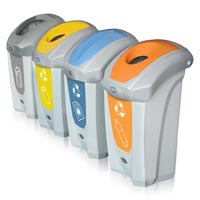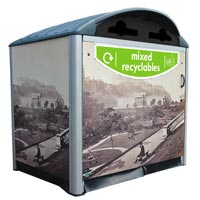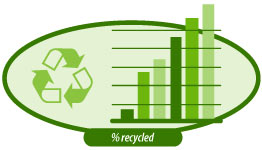According to the Connect Skills and Sustainable Development Study by the National Students Union in the UK, almost three-quarters of students agree that all courses should actively incorporate and promote sustainable development.*
Here are some top tips to help inspire the students of today to make those sustainable choices for the campus of tomorrow:
1. Improve the ease of recycling
The convenience and visibility of recycling bins are key. Prevent recyclable and biodegradable materials from ending up in general waste and litter bins by placing recycling bins in easily accessible areas to both students and staff members on campus.
Place recycling bins in the following areas:
- Cafeteria's and common rooms
- Classrooms and busy hallways or corridors
- Sports facilities and science labs
- Student dorms and apartments
High footfall areas are likely to receive a large amount of waste, so ensuring you have enough recycling facilities in these areas can help to boost your campus recycling rates.

2. Conduct a waste audit
Different locations on campus will produce different volumes and types of waste. Conducting a waste management audit will help you gain a clearer picture of the waste streams you need to tackle and where they are most prominent.
Use the results of your waste management audit to determine which litter bins and recycling bins are needed and site them accordingly. The audit will also help to prevent any unnecessary spending and improve performance against your campus recycling goals.
Need help with your audit? We offer free, no obligation advice and assistance, whereby a member of our team is available to visit you on site to help assess your requirements. Request your free waste management audit here.
3. Standardize recycling facilities

Keeping your recycling containers consistent in terms of aesthetics will clearly indicate to both students and teachers which bins are meant for recycling.
We offer a variety of stylish recycling bins to suit any location. The Nexus® 30 range of recycling bins – are ideal for indoor environments as they can be easily sited under desks or at the side of work areas.
Alternatively, site your indoor recycling bins side-by-side to form an attractive recycling station.
For external environments, the Nexus® 200 Duo Recycling Bins are ideal for collecting multiple waste streams in one unit. With a large 200-litre capacity, these containers are the ideal solution for outdoor recycling on college campuses.
4. Use recognizable graphics
Students and teachers may be unaware of what can and can’t be recycled on campus. Providing accurate information and graphics where necessary can help to educate others and inspire a positive behavioral change.
Create user-friendly recycling guides to notify students about where to find recycling bins on campus and which waste streams are accepted. You can also create informational sign kits to show which waste should be deposited into each container.
We offer the option to add a sign kit with standard or custom graphics to a wide range of our recycling containers. Take a look at our 5 Step Personalization Guide for more information.
Use recognizable graphics consistently on recycling bins across campus to help to reduce cross-contamination levels while increasing recycling rates.

You can even personalize your recycling graphics with your branding or crest, to inspire students to support their college in recycling.
5. Integrate sustainability into learning
A birds eye view look at sustainability in higher education by the Environmental Association for Universities & colleges (EAUC) states that there has been Significant growth in sustainability initiatives since the late 1990’s –95% of Australian universities have environmental policies –90% have environmental management plans, and most universities and TAFES include sustainability related content in coursework** ACTS (Australasian Campuses Towards Sustainability) are a non-profit member-based organization that represent tertiary education institutions within Australia and New Zealand. ACTS aims to inspire, promote and support change towards best practice sustainability within the curriculum, operations and research of the higher education sector. You can Register your institution for the opportunity to be provided with the knowledge, resources, developmental and networking opportunities to lead sustainability in education.
Alternatively, incorporate sustainability into your curriculum by providing students with Education for Sustainable Development (ESD) classes, which is part of a Global Action Program founded by UNESCO.
The course provides students with the knowledge, skills and attitudes to empower them to contribute to a sustainable future, which will get them more involved in environmentally friendly practices.
Find out more with the UNESCO: Roadmap for Implementing the Global Action Programme on Education for Sustainable Development resource.
6. Spread the word
Raise awareness about your campus recycling goals using a dedicated recycling committee. Generate posters, schedule e-newsletters or add a recycling column to the college newspaper to get the word out and encourage others to get involved in reaching those targets.
You could even elect recycling captains for each class to monitor waste diversion levels on a room-by-room basis. This would make it easier to ensure that recycling rates do not drop after the initial impact has been made.
7. Drop off your old items for reuse
Provide alternative bins for recycling unwanted items in dedicated drop-off points around the college.

Recycle unwanted clothes with solutions such as the Modus™ Housing which hide large capacity wheeled containers. Add clear graphics to make the bin easily identifiable for its dedicated use.
Why not provide somewhere for students to recycle their used books? The Nexus® 140 Recycling Container is a large volume collection unit which would be ideal as a personalized drop-off point for pre-loved books in libraries or other busy communal areas around campus.
8. Make the switch
Encourage students to cut down on single-use plastic items and switch from plastic utensils, bottles and straws to reusable alternatives.
In cafeteria's and café’s, why not provide an alternative to plastic straws by changing to paper, pasta or other biodegradable options?
Stopping the sale of bottled water and providing water fountains is also a good way to encourage students to bring their own reusable bottles to re-fill.
Why not also make the switch in other areas on campus and change your seats and benches to Recycled Material Seating? Providing eco-friendly seating made from recycled polymer and sustainable materials is beneficial as they are low maintenance and have a long service life, as well as being 100% recyclable
These are all small ways to make more sustainable choices that can make a huge environmental difference in the long run.
9. Publish your results!

Monitor your recycling levels and generate updates each semester on how the college is progressing with its waste management goals. This will not only allow you to track your progress, but it can help to keep recycling at the front of people’s minds.
Let the student body know how well they are doing to inspire a permanent change when it comes to waste disposal.
10. Review & repeat
It is a good idea to refresh your recycling program on a regular basis.
Look back on how the college performed to determine what techniques worked well and decide if any changes need to be made. Consult with the recycling committee to identify any problems and conduct regular waste audits to ensure that you’re making the most of your recycling containers.
For more information on our range of sustainable products that can help you create a more eco-friendly campus, speak to one of our friendly advisors via LiveChat today.
Sources:*https://s3-eu-west-1.amazonaws.com/nusdigital/document/documents/40947/02c4d3af825c7330fe1624ee2e83cd36/20180109_NUS_Sustainability_Skills_20162017_REPORT_FINAL.pdf
** https://slideplayer.com/slide/6265511/




